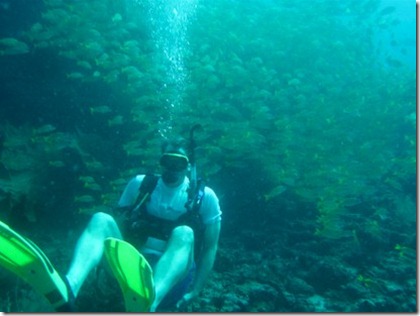
Something else that bothers me personally when I am in the Maldives, is equalising (the process of adjusting pressure in your sinuses whn scuba diving). With such world class snorkelling in the Maldives, it was some years after my wife started diving that I joined her in getting certified and one of the disincentives for me was general sinus issues which made for equalisation difficulties. For the 6 years I have been diving, these issues persist in irritating my dives, but over that time I have collected a range of tips from various divers and dive masters on how to alleviate the problem.
There are the classic tips that you learn when you get certified like…
- Wiggle ear and jaw.
- Hold nose and blow gently (I did find that a problem I had was trying to blow too firmly which both hurt my ears and wasted air).
- Descend slowly.
- Rise 2/10th metre when you start to feel discomfort.
Since taking the Scuba course, picked up the following added tips.
- Snort salt water. Before descending, suck some ocean water up through your nose. It actually works a treat to open up the sinuses. It’s not far off the traditional remedy for throat problems of gargling with salt water. However, Claudio at Sea Dragon Diving with Maafushivaru informs me that in most places that is a good trick, but in the Maldives there are many micro-organisms in the water the practice can cause infection. If you like this approach and are concerned about this, then you could bring some pharmaceutical saline solution with you.
- Sudafed. Or any non-drowsy cold decongestant. The scuba course will tell you not to take drugs for a number of good reasons (eg. they could have adverse side effect which is why you need to be careful to get non-drowsy ones, they could wear off and then problems could occur when you are in process of diving, they could mask serious issues or symptoms). In short, in the interest of absolute safety, the advice is that if you need any drugs to make diving comfortable, then you shouldn’t be diving. But, that advice is really geared toward people not well. If you are well, I have met a number of divers who do practice taking some Sudafed to assist the biological processes of opening up the sinuses and making equalisation easier. Note, my friend and veteran diver Eileen Brown informs me that pseudoephedrine can causing fainting if you descend to 30 metres (rare in the Maldives).
- Beconase (beclometasone). Same concept as Sudafed, but a different (and possibly more effective and immediate delivery mechanism). Beconase (the OTC name) is a nasal spray that opens up the nasal passages. It was recommended to me by my doctor for general draining of fluid from my ears after a cold. I had had blocked ears for weeks, but after one puff of the spray, my ears started that distinctive ‘crackling’ sound of clearing.
- Swim parallel above rest of group. Many times it just takes longer for the equalization to happen. The problem is that you feel that you need to descend to keep up with your group and it is the rushed descent that causes the discomfort. The divemaster at Lily Beach Nicole encouraged me to simply swim above the group, but keeping the group in view, and descend at my own pace (also, in addition to my buddy, she kept an extra eye out for me).
- Relief, Not Release. Sometimes when you equalise, you get an incredibly satisfying squeak in your ears as the pressure finally squeezes through your ear channel to balance. I used to make the mistake of trying too hard to equalise and pushing to hard to try to achieve this effect. But this was the wrong approach. Not only did I fail to achieve the release, but the pushing too hard meant that I probably aggravated my sinuses and wasted extra air in the process. What I learned to do was the more gentle holding nose and puffing. The objective was not to get the ‘release’, but simply to ‘relieve’ the pressure on the sinuses. I soon realised that I could do the entire descent without the magic release, but I would avoid all discomfort by just gently working on keeping the pressure strong in my sinuses.
- Turn Down the AC. Air conditioning dries the tissues in the ears, and then when you emerge into the nearly 100% tropic humidity, it expands the tissues which will tighten up the ear canals.
- Push 2 Fingers Behind the Jaw. Find the soft tissue just behind the end of the jaw bone and carefully push into the soft tissue. It will feel a bit uncomfortable, but done properly with relax the tissue located there which can contribute to the tightening of the ear canals (courtesy of Thomas at Werner Lau, Medhufushi).
- Vented Earplugs. These special type of earplugs can alleviate pressure on the ear drum. Here is an article on them (thanks Stu and Nicki).
- Olbas Pastilles. Any eucalyptus lozenge should do to open up the sinuses before a dive, but many melt in the heat, while Olbas brand don’t (another Eileen tip).
- Vented Earplugs. These special type of earplugs can alleviate pressure on the ear drum. Here is an article on them (thanks Stu and Nicki).).
- One Side Head Tilt. If one ear is working but the other is blocked, then turn your head with blocked one toward the surface because the air is always going up and the pressured air from inside your head will go up to your blocked side to help equalise (thanks Marco Bongiovanni, Makunudu).
- Surgery. A rather dramatic solution, but one that might be a practical resort especially if the problems are confirmed to be due do abnormalities in the sinus tissue like a deviated septum. Such procedures are typically reserved for people with conditions like sleep apnea or recurring sinusitis, but it can be a appropriate and very helpful for individuals involved with diving. Not a very common solution, but Patrick Spitz, Sea Explorer Diving, Reethi Faru noted that one of his staff was getting the operation due to her persistent issues from this cause (thanks Patrick).
- Oil Drops. A traditional remedy for ear aches and infections (which do not have any medical evidence to support its efficacy) is using various oils (eg. Vitamin E,m Vitamin A, even Olive Oil) can soften the ear tissues to make them more flexible and easy to equalise (especially if they have gotten dried out from repeated immersion in salt water washing away the natural oils). (thanks Danni.
- Tilt Head Down Toward the Difficult Ear. Doing this will allow the air trapped/expanding in the ear canal to “float” toward the surface, ie. away from the eardrum that is uncomfortable, providing that air a path to escape to in the ear canal.
Here are some more handy tips from Aquaview.
